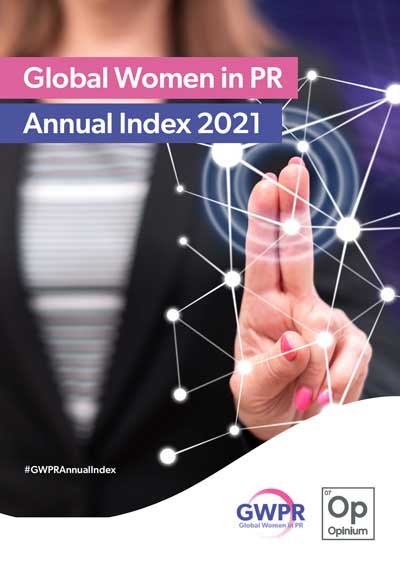
Published 11th Jan 2022
For women working in PR and Communications it has been a challenging year. The Covid pandemic has dramatically changed the way we work, but the survey results from GWPR’s third Annual Index show very little has changed in moving towards a more balanced board room and increasing the number of female leaders. In a global industry that is two-thirds female the majority of board directors continues to be men.
The Index, designed to track and measure the position of women working in the PR and Communications industry globally, has shown that progress towards equality has slowed, in spite of the backdrop that a balanced board room helps create a more successful business.
In partnership with strategic insight agency Opinium, the survey questionnaire covered the working environment, the pressures of working in PR, the barriers to women taking on leadership roles, the impact of being a parent, the gender pay gap and sexual harassment in the workplace.
In addition to highlighting the imbalance of men and women in senior roles, the research asked what was needed to change the situation. What were the drivers that could help more women working in PR and Communications take on senior roles?
Remote working was felt to be the most important initiative by 57% of PR professionals – ahead of financial reward – and 73% also say they would be more likely to choose a job that offered flexible working over one that did not (up from 69% in 2020).
The research also revealed that 91% of PR professionals are currently working flexibly and most believe that post-pandemic hybrid working will continue. On average respondents believe they will be working remotely three days a week over the next 12 months and 21% think they will be working remotely full time.
Looking at the potential barriers women face when it comes to progressing into senior positions, it is not surprising that the biggest barrier continues to be childcare or caring responsibilities. Related to this, three-quarters in the survey felt that a lack of flexible working and family-friendly policies prevented women from progressing into senior positions. A similar number believed the lack of work-life balance in a senior role was another barrier. The recent changes in working practices caused by the pandemic should help women break down these barriers and improve their career progression.
The 2020 Annual Index research found that PR professionals working in-house were more likely to have taken time off work because of stress, compared to their agency counterparts. This year, that gap has closed completely, yet a third of both in-house and agency-side professionals say they have had to take time off for their mental health.
For many women working from home during the pandemic has meant having to juggle child care responsibilities, domestic duties and a busy workload. Not surprisingly many women have experienced burn out and only around a half of PR professionals currently claim to have a good work-life balance. Worryingly, over a third of respondents are not offered any mental health support initiatives by their organisations.
When it comes to comparing the career progression of mothers and fathers, the gender difference continues to be stark. Half (51%) of PR professionals feel mothers are promoted more slowly, compared to just 4% of fathers.
Women working in PR agencies appear to have an easier career path than their counterparts working in-house. They are twice as likely to be promoted faster and twice as likely to reach a boardroom position.
Over four-fifths of PR professionals believe that having women in the boardroom helps improve both the productivity and the creativity of the company. These figures have both increased since the start of the research three years ago. When it comes to working practices, 82% believe that having women in the boardroom can help improve company working practices, with 81% believing that having women on boards clears barriers to promotion for other women.
Many believe there is also a lack of transparency, which creates a barrier for women attaining more senior roles, with women tending to be less proactive than men when it comes to asking for promotion.
Flexible working practices are considered the top initiative to enable more women to take on board room roles. This has reclaimed the top spot from “having more senior female role models” which was highlighted last year. Other initiatives identified to help women’s career progression are mentoring schemes, more senior recognition of the issues around gender inequality and training opportunities.
Commenting on these findings Angela Oakes, Joint President and Co-Founder of GWPR said, “With the changes to more flexible working practices being brought about by Covid and a real recognition by businesses that women, and a truly diverse workforce, really do make a difference to the profitability of a company, there is light at the end of the tunnel. We hope that our 2022 Annual Index will show that the dial has moved to a better place for all of us in our industry, which still remains two-thirds female.”






